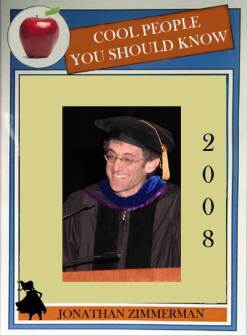
It is a rare talent that can filter the mass of information around us, process it, and spit it back out to shed new light on things we thought we already understood. Among educational researchers, few share Jonathan Zimmerman‘s knack for cutting to the core of the issues of the day.
A historian who teaches at NYU, Zimmerman is the author of three books that examine cultural and political conflict in our schools throughout history. His first book, Distilling Democracy: Alcohol Education in America’s Public Schools, 1880-1925, reviews conflicts over how children were taught about alcohol during the temperance movement and prohibition. His second book, Whose America? Culture Wars in the Public Schools investigates the role of advocacy groups in determining what should be taught in schools. His most recent book, Innocents Abroad: American Teachers in the American Century, was inspired by his own experience as a Peace Corps volunteer in Nepal. It examines the experiences of - and lessons learned by - American teachers abroad.
You can catch Zimmerman’s incisive takes on current events in his regular op-eds that appear in papers throughout the country. For example, in his op-ed, “How Special are Your Needs?”, he reflects on the reaction to Palin’s claim that children with special needs will have a friend and advocate in the White House if she is elected. Why is it, he asks, that we see children of special needs as deserving of public support, while we largely ignore the needs of children of poverty? What makes some kids, he wonders, more special than others?
And perhaps more relevant today is his recent TC Record commentary, “Sarah Palin and the Assault on Merit.” As we await the debate, I’ll leave you with this excerpt:
[Historically] The dispute lay in the measurement of ability, not in its significance. Nobody questioned whether skill matters, or whether society should recognize and reward it. Nobody, that is, until this election cycle. In the smiling face of Sarah Palin, we see something fresh and truly remarkable in American history: the anti-merit candidate. Some people have gamely tried to depict Palin as a kind of Jeffersonian natural aristocrat, a sharp diamond plucked out of the Alaskan rough. More commonly, though, they have embraced her for her lack of special talent, ability, or knowledge. There's nothing special about Sarah Palin, and that's precisely what is so new--and so special--about her. And that brings us back to "elitism," which Palin's defenders inevitably invoke whenever anyone questions her qualifications. The very charge shows how far we have strayed from the meritocratic ideal. It ignores the difference between deserved and undeserved elitism, suggesting that any claim to high status is somehow suspect. And it makes a mockery of our entire government, implying that anyone among us is good enough to lead it. In one of his best-known quips, the conservative icon William F. Buckley said he would rather be governed by the first 300 names in the Boston phonebook than by the faculty of Harvard University. In the end, though, Buckley didn't want either group in charge. He rejected the faculty's left-liberal politics, of course, but he also recoiled at the notion of any average Joe at the helm. He was, in short, an elitist. And so am I. In a time of economic turmoil at home and enormous peril overseas, we need extraordinary—not ordinary--leaders. Woe to America if we fall victim to the seduction of Sarah Palin, who tricks us into thinking that Everyman---or Everywoman---is good enough for us all.